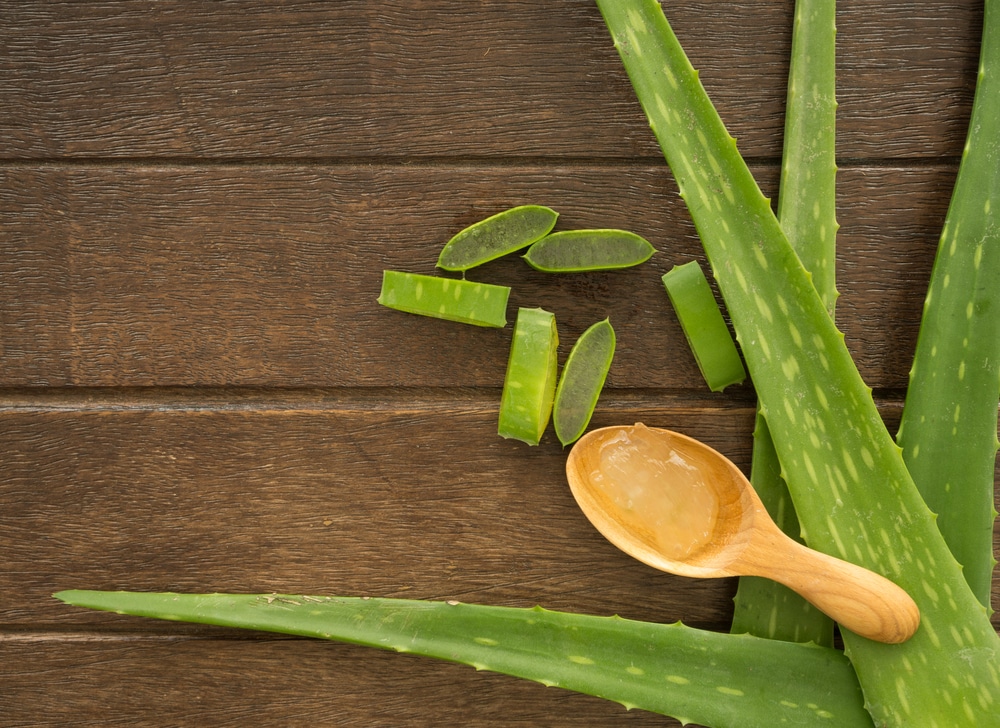Ever wondered why aloe vera is often referred to as the “potted physician”? Aloe vera is one of the most versatile plants in the world. It has a long history of use for medicinal purposes, and today, it’s still used to treat a variety of conditions. This plant has its origins in North Africa, and it was introduced to Europe in the 16th century. It became popular as a natural remedy for a variety of illnesses. Aloe vera is still used today to treat skin conditions, such as psoriasis and eczema, and it’s also shown potential for other conditions, such as diabetes and asthma (3). In this article, we’ll take a closer look at the possible benefits of aloe vera plant in home.
Treating Burns
Sunburn, chemical burns, and thermal burns can all be treated topically with aloe vera (3).
Aloe vera is a natural analgesic, which means that it helps to reduce pain. It’s also a natural anti-inflammatory, which makes it ideal for treating burns. The gel from the aloe vera plant can help to soothe the skin and promote healing (3).
Treating Acne
Acne can be a difficult condition to treat, but aloe vera may be able to help.
Aloe vera is a natural anti-inflammatory and antibacterial agent, which makes it ideal for treating acne. The gel from the plant applied topically may help to reduce inflammation and kill bacteria, which might help to clear up acne (3).
Improving Digestive Health
Aloe vera is sometimes used orally to treat digestive problems, such as constipation. The plant contains anthraquinone compounds which have a laxative effect, as well as a number of beneficial nutrients, including fiber and vitamins, which can help to improve digestive health (6).
Aloe vera is also theorized to be able to help reduce inflammation in the gut, which can lead to better digestive health for those suffering from ulcers or inflammatory bowel disease (6).
Reducing Inflammation
Chronic inflammation is thought to contribute to a number of health problems, such as heart disease and arthritis (3).
Aloe vera is a natural anti-inflammatory, which means that it may help to reduce inflammation in the body. The plant contains a number of beneficial compounds, including antioxidants and polysaccharides, which have the potential to help reduce inflammation (3). More research needs to be done on whether it can be effective for this purpose, and in what dose and administration method.
Read More: Healthy Spices List: 13 Flavorful Herbs And Their Health Benefits
Promoting Oral Health
Plaque and gingivitis can be reduced with the use of aloe vera. The plant contains a number of antibacterial compounds, which can help to kill bacteria in the mouth. Aloe vera may also help to reduce inflammation in the mouth, which can lead to better oral health (5). Talk to your dentist about whether and how to use aloe vera gel to treat or prevent plaque and gingivitis.
Candida Yeast Infection
Aloe vera may help to treat candida yeast infections. The plant contains a number of antifungal compounds, which can help to kill the fungus that causes candida yeast infections. Aloe vera is also a natural anti-inflammatory, which can help to reduce inflammation. Aloe extract is being studied for its potential in the treatment of fungal infections (8). It isn’t currently recommended as a treatment on its own – more research is needed.
Managing Diabetes
Aloe vera has been used traditionally to manage diabetes, and some scientific evidence is emerging to support this (3).
The plant contains a number of beneficial compounds, including antioxidants and polysaccharides, which may help to reduce blood sugar levels. Aloe vera may also help to improve lipid profiles in diabetic patients, potentially reducing the risk of heart disease which is a major complication of type 2 diabetes (3).
Relieving Anal Fissures
Anal fissures can be a painful condition, but aloe vera may be able to help. The plant contains a number of anti-inflammatory compounds, which can help to reduce inflammation and promote wound healing in the area, which can help to relieve symptoms (7).
Treating Psoriasis
Psoriasis is a skin condition that can cause red, inflamed patches on the skin. Aloe vera is a natural anti-inflammatory, which can help to reduce inflammation in the skin. The plant also contains a number of antioxidants, which can help to promote healing in the skin (6).
Treating Eczema
Eczema is a skin condition that can cause red, itchy patches on the skin. Aloe vera is a natural anti-inflammatory, which can help to reduce inflammation in the skin. The plant also contains a number of antioxidants, which can help to promote healing in the skin (4).
For Healthy Hair
Aloe vera can be used to improve the health of hair. The plant contains a number of beneficial compounds, including vitamins and minerals, which can help to nourish the hair. Aloe vera may also help to reduce inflammation in the scalp, which can lead to better hair health (6).
BetterMe app will kick you out of the mental funk, shake off your extra weight, rid you off your energy-zapping habits, and help you sculpt the body of your dreams. Intrigued? Hurry up and change your life for the better!
To Reduce Wrinkles
Aloe vera can be used to reduce the appearance of wrinkles.
The plant contains a number of beneficial compounds, including antioxidants and polysaccharides, which can help to reduce inflammation and may promote collagen production. This can help to reduce the appearance of wrinkles (3).
Is Aloe Vera Safe?
Aloe is generally well tolerated when used topically, although minor skin irritation may occur in some people.
When taken internally, aloe may cause cramps, diarrhea, and nausea. Aloe should not be used by pregnant women or people with diabetes without first speaking to a doctor (2). Speak to a doctor before using aloe if you are taking medication or have a medical condition.
The following people may need to avoid taking aloe vera orally due to its laxative effect (1):
- People with hemorrhoids
- People with renal disorder or other kidney conditions
- People with IBS or other bowel conditions
- Pregnant women
- People taking medication for diabetes, high blood pressure, or heart conditions.
- People with intestinal obstruction
- Those suffering from Crohn’s disease or ulcerative colitis.
If you experience any side effects, discontinue use and seek medical care.
Possible Side Effects Of Aloe Vera
Consuming this plant might result in the following side effects (2):
- Cramps
- Diarrhea
- Nausea
- Blood in urine
- Muscle weakness
- Low potassium
- Kidney issues
- Interaction with diabetes medications
- Drowsiness
- Headache
Read More: Bergamot Essential Oil Benefits And Side Effects
How To Grow And Care For An Aloe Vera Plant At Home
Aloe plants are fairly easy to grow provided they get enough sunlight and warmth. They are succulents, so they store water in their leaves, which can make them drought tolerant.
Aloe plants also have medicinal properties and have been used for centuries to treat a variety of skin conditions.
If you are interested in growing an aloe plant, the following tips will help you get started:
- Choose a pot that is at least six inches deep and has a drainage hole.
- Fill the pot with a quality potting mix.
- Place the aloe plant in the pot and cover the roots with soil.
- Water the plant thoroughly and allow the soil to dry out before watering again.
- Place the plant in a location that receives full sun or partial sun.
- Fertilize the plant once a month with a balanced fertilizer.
- Prune the plant as needed to keep it healthy and looking good.
Avoid overwatering your aloe plant, as this can lead to root rot. Aloe plants only need to be watered about once a week, depending on the climate and the potting mix used. If the leaves start to turn yellow, it means the plant is not getting enough water.
What Are The Signs Of A Sick Aloe Vera Plant?
If you’re not sure whether your aloe vera plant is sick or just needs a little love, check for these common signs of illness:
- Wilted or drooping leaves
- Leaves with brown spots or edges
- A change in the color of the gel inside the leaves
- Pests such as aphids or mealybugs
- White fuzz on the leaves or stem
- Rotting stem or leaves
If you see any of these signs, it’s time to take action! You can try treating your plant yourself with a home remedy, or take it to a professional for more intensive care.
Avoid these mistakes to ensure a healthy plant:
- Not watering the plant enough or letting it dry out
- Overwatering the plant
- Placing the plant in direct sunlight or near a heat source
- Fertilizing the plant too often or using the wrong type of fertilizer
Instead, follow this care tips for a healthy, juicy succulent:
- Water the plant every 2-3 weeks, or when the top inch of soil feels dry to the touch
- Place the plant in indirect sunlight or a room with moderate light
- Fertilize the plant every 2 months using an organic succulent fertilizer
- Remove any dead leaves or flowers regularly
With a little bit of TLC, you’ll have fresh aloe in your reach all year round!
Lean and toned up body isn’t just a far-fetched fantasy. Check out the BetterMe app and watch it propel your weight loss journey into high gear!
How To Harvest The Plant
It’s quite simple to harvest the aloe plant for gel and juice. Ensure that your plant is at least a few years old and has a good amount of gel before harvesting.
- Cut off a section of the plant that has at least two leaves attached.
- Use a sharp knife to cut the leaves from the stem.
- Avoid the roots when harvesting.
- Wash and dry the leaves before using.
- Use a knife to trim off the prickly edges of the leaves before using.
- Use a knife to separate the gel from the skin of the leaves.
- Store the gel in an airtight container in the fridge.
How To Use Fresh Aloe Gel
There are a number of ways you can use fresh aloe gel (6):
- Apply it to skin irritations or sunburns.
- Use it as a natural moisturizer.
- Mix it with water and drink it as a health drink.
- Use it in smoothies or juices.
- Add it to your face mask.
- Use it as a hair treatment.
The Bottom Line
Aloe vera is a plant that has been used for centuries for its medicinal properties. The gel from the aloe vera plant has been traditionally used to treat a number of conditions, including burns, acne, digestive problems, oral health problems, and candida yeast infections.
Exercise caution when taking aloe vera orally, as the plant may have a laxative effect. Speak to a doctor before taking aloe if you are pregnant or have a medical condition.
DISCLAIMER:
This article is intended for general informational purposes only and does not serve to address individual circumstances. It is not a substitute for professional advice or help and should not be relied on for making any kind of decision-making. Any action taken as a direct or indirect result of the information in this article is entirely at your own risk and is your sole responsibility.
BetterMe, its content staff, and its medical advisors accept no responsibility for inaccuracies, errors, misstatements, inconsistencies, or omissions and specifically disclaim any liability, loss or risk, personal, professional or otherwise, which may be incurred as a consequence, directly or indirectly, of the use and/or application of any content.
You should always seek the advice of your physician or other qualified health provider with any questions you may have regarding a medical condition or your specific situation. Never disregard professional medical advice or delay seeking it because of BetterMe content. If you suspect or think you may have a medical emergency, call your doctor.
SOURCES:
- Aloe (2020, mayoclinic.org)
- Aloe vera: A review of toxicity and adverse clinical effects (2019, nih.gov)
- ALOE VERA: A SHORT REVIEW (2008, nih.gov)
- Aloe vera in dermatology: a brief review (2009, pubmed.gov)
- Benefits of Aloe vera in dentistry (2015, nih.gov)
- Chapter 3 Evaluation of the Nutritional and Metabolic Effects of Aloe Vera (n.d., nih.gov)
- Effects of Aloe vera cream on chronic anal fissure pain, wound healing and hemorrhaging upon defection: a prospective double blind clinical trial (2014, nih.gov)
- The effect of Aloe vera ethanol extract on the growth inhibition of Candida albicans (2020, nih.gov)













